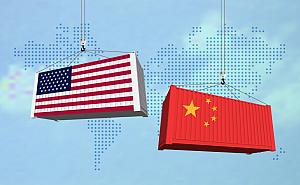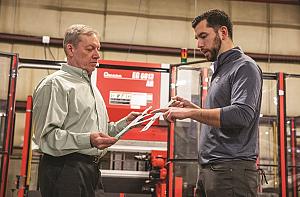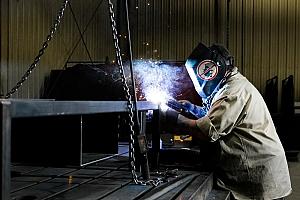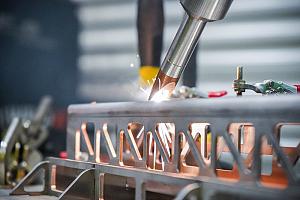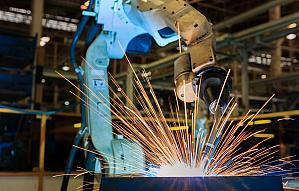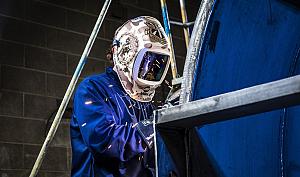- FMA
- The Fabricator
- FABTECH
- Canadian Metalworking
Categories
- Additive Manufacturing
- Aluminum Welding
- Arc Welding
- Assembly and Joining
- Automation and Robotics
- Bending and Forming
- Consumables
- Cutting and Weld Prep
- Electric Vehicles
- En Español
- Finishing
- Hydroforming
- Laser Cutting
- Laser Welding
- Machining
- Manufacturing Software
- Materials Handling
- Metals/Materials
- Oxyfuel Cutting
- Plasma Cutting
- Power Tools
- Punching and Other Holemaking
- Roll Forming
- Safety
- Sawing
- Shearing
- Shop Management
- Testing and Measuring
- Tube and Pipe Fabrication
- Tube and Pipe Production
- Waterjet Cutting
Industry Directory
Webcasts
Podcasts
FAB 40
Advertise
Subscribe
Account Login
Search
Manufacturing associations react to Trump’s announced tariffs on imported aluminum, steel
- March 2, 2018
- News Release
- Shop Management
President Trump has announced his decision to impose tariffs of 25 percent on steel imports and 10 percent on aluminum imports, and representatives of the U.S. metal fabricating and manufacturing industry are reacting with strong disappointment.
This decision, designed to protect U.S. metal producers from unfairly traded imports, culminates a nearly 11-month Commerce Department investigation into whether imports of steel and aluminum endanger U.S. national security. In February the Commerce Department announced its findings that imports of these metals do pose a threat.
While the tariffs are considered a benefit to U.S. metal producers, associations representing manufacturers that use steel and aluminum in their products are expressing their concern.
In February, Elgin, Ill.-based Fabricators & Manufacturers Association Intl.® and 14 other trade associations representing more than 30,000 U.S. steel-using manufacturers that employ 1 million American workers sent a letter to President Trump and other senior trade officials warning that Section 232 restrictions on basic steel imports would “undermine [U.S. steel using manufacturers’] competitiveness and our ability to make value-added products here.” The letter continued, “In that event, these products will be made elsewhere, resulting in lost business and jobs for our members and reduced purchases from the domestic basic steel industry. Everyone in the U.S. steel supply chain will be damaged by restrictions on steel imports.”
The letter pointed out that the 1 million U.S. jobs represented by these steel-using associations compares to 80,000 in the domestic steel industry, and that domestic steel manufacturers are reporting their best earnings in more than a decade.
The Air-Conditioning, Heating, and Refrigeration Institute (AHRI), which represents manufacturers of heating, air conditioning, commercial refrigeration, and water heating products and equipment, announced it is “disappointed in the decision announced … by President Trump to impose additional tariffs on steel and aluminum. As it made clear in letters to the president and to Commerce Secretary Ross and U.S. Trade Representative Lighthizer, AHRI does not support additional tariffs on steel and aluminum due to their impact on manufacturers and consumers.”
“As major users of steel and aluminum, we have been proactive in explaining to the administration that the HVACR and water heating industry would be negatively impacted by an increase in tariffs, as would the consumers that rely on the products we manufacture,” said AHRI President & CEO Stephen Yurek. “While we have been pleased with the Trump administration’s enthusiastic support for manufacturing, we believe this step to be injurious, rather than helpful, to our efforts to increase American manufacturing and create jobs.”
Roy Hardy, president of the Precision Metalforming Association, and Dave Tilstone, president of the National Tooling and Machining Association, released the following statement:
“The steep tariffs on steel and aluminum that President Trump announced … imperil the U.S. manufacturing sector, and particularly downstream U.S. steel and aluminum consuming companies, who alone employ 6.5 million Americans compared to the 80,000 employed by the domestic steel industry. The tariffs will lead to the U.S. once again becoming an island of high steel prices resulting in our customers simply importing the finished part. The lost business to overseas competitors will threaten thousands of jobs across the United States in the steel consuming manufacturing sector, similar to our experience in 2002 when the U.S. last imposed tariffs on steel imports. Those ‘201’ steel tariffs resulted in the loss of 200,000 American manufacturing jobs (more than employed by the entire domestic steel industry) because of high steel prices due in large part to the tariffs. President Trump campaigned on the promise to protect manufacturing jobs, but by ignoring warnings from a wide range of manufacturers, his plan to impose tariffs will cost manufacturing jobs across the country. Our associations plan to work to end these tariffs as soon as possible so that he fulfills that commitment.”
Related Companies
subscribe now

The Fabricator is North America's leading magazine for the metal forming and fabricating industry. The magazine delivers the news, technical articles, and case histories that enable fabricators to do their jobs more efficiently. The Fabricator has served the industry since 1970.
start your free subscription- Stay connected from anywhere

Easily access valuable industry resources now with full access to the digital edition of The Fabricator.

Easily access valuable industry resources now with full access to the digital edition of The Welder.

Easily access valuable industry resources now with full access to the digital edition of The Tube and Pipe Journal.
- Podcasting
- Podcast:
- The Fabricator Podcast
- Published:
- 05/07/2024
- Running Time:
- 67:38
Patrick Brunken, VP of Addison Machine Engineering, joins The Fabricator Podcast to talk about the tube and pipe...
- Trending Articles
How laser and TIG welding coexist in the modern job shop

Young fabricators ready to step forward at family shop
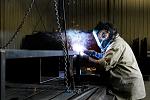
Material handling automation moves forward at MODEX

A deep dive into a bleeding-edge automation strategy in metal fabrication

BZI opens Iron Depot store in Utah

- Industry Events
Laser Welding Certificate Course
- May 7 - August 6, 2024
- Farmington Hills, IL
World-Class Roll Forming Workshop
- June 5 - 6, 2024
- Louisville, KY
Advanced Laser Application Workshop
- June 25 - 27, 2024
- Novi, MI
Precision Press Brake Certificate Course
- July 31 - August 1, 2024
- Elgin,

